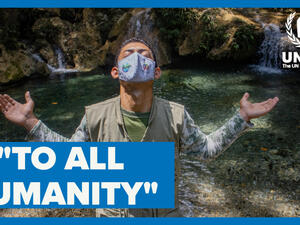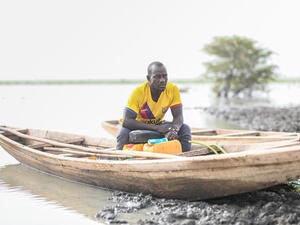Refugees cook up appreciation for the environment in Rwanda
Refugees cook up appreciation for the environment in Rwanda

Refugees judge differently-cooked beans in a Blind Taste Test during Environment Week in Kiziba Camp, Rwanda.
KIZIBA REFUGEE CAMP, Rwanda, November 14 (UNHCR) - Dancille, a Congolese refugee who heads the refugee women's committee here, became something of a trailblazer last year - one of the first to adopt an environmentally friendly stove to replace Africa's traditional but wasteful system of open-fire cooking.
It has been a big success, she says now with a proud smile: "This stove cuts in half the quantity of wood we previously needed for cooking." (Her enthusiasm may have run away with her - UNHCR estimates the savings at closer to 20 percent.)
Energy-saving efforts - including new cooking methods and new portable stoves - are crucial in Kiziba Camp in Kibuye Province in western Rwanda. More than 17,000 Congolese refugees reside in the camp, not far from the Kivus in their own country, the Democratic Republic of the Congo. So many people in such a relatively small area put undeniable pressure on the forests surrounding the camp.
The recently concluded Environment Week celebrations in the camp spotlighted the need to alleviate the refugees' impact on the environment in and around the crowded camp, where mud brick houses sit close to each other, interspersed with an increasing number of small garden plots.
"Women in the camp highly welcome educational activities like this one, since the adoption of new techniques is already helping us to save on the quantity of wood used for cooking," Dancille told an official ceremony held in the camp. "Training about how to make and use a new improved stove will allow us to share this knowledge with other women in the camp in order to adopt more economic cooking methods."
Refugees and guests, including Rwandan local authorities and UNHCR officials, had a chance to test the environmentally-friendly cookers and debate their merits with technicians. In a Blind Taste Test, they sampled beans and corn which had been cooked using different methods - from the traditional wood-burning open-fire method to some of the new stoves.
There was no clear winner - which was a pretty good result for the new stove given the length and strength of the culinary tradition it was challenging. Nevertheless, the outcome underlined the need for technicians and refugees to continue the search for stoves that save energy and also produce tasty food.
Celebrating Environment Week in this camp for only the second year, UNHCR and refugees went beyond the need to conserve firewood, to introduce calls for better nutrition and better sanitation.
Those messages were brought home by refugees playing out a humorous sketch. The audience of about 300 refugees laughed appreciatively at the sight of a male refugee dressed as a woman attempting to teach a real woman how to cook.
Showing that he had grasped the serious intent behind the humour, Paul Nkubana, president of the Kiziba Camp Committee, said "bad habits regarding waste management and sanitation are relevant problems in the camp and they can only be solved through education and sensitization campaigns like this one."
By Beatriz Gonzalez in Kiziba Camp, Rwanda









